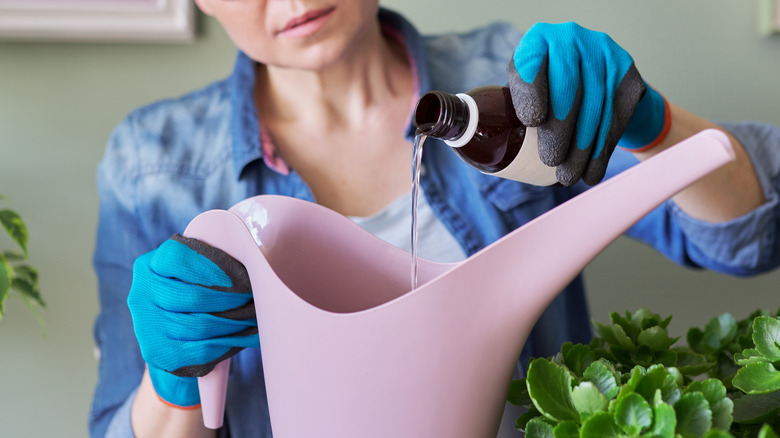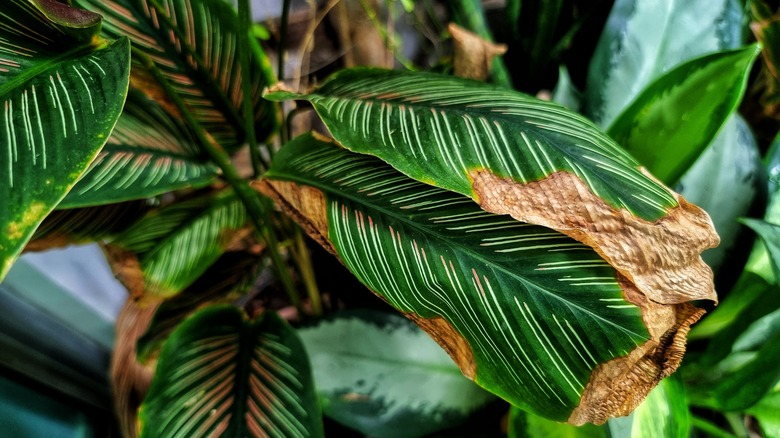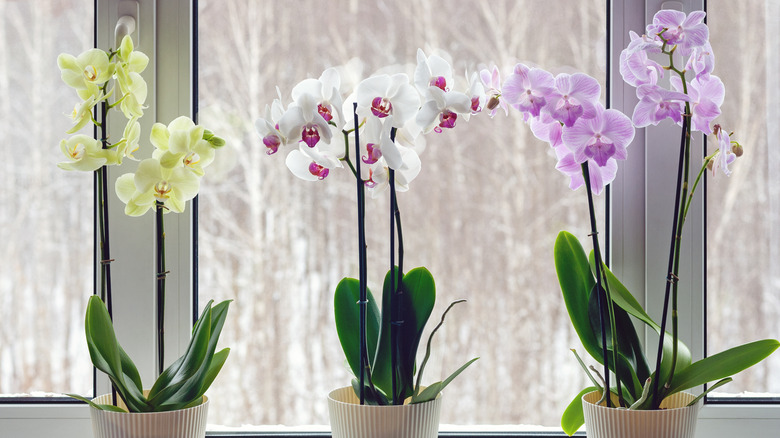Why You Should Think Twice Before Fertilizing Your Houseplants During Winter
While fertilizing your houseplants can be extremely beneficial to their health, it's important to consider how your plants' needs change during the colder, darker months. Though you may be worried that your indoor plants might require extra nutrients to thrive throughout winter, continuing to fertilize them could cause serious problems or even kill them. Many types of houseplants will not need fertilizer from the beginning of cold weather in November until spring emerges in March.
Kiersten Rankel, a certified Louisiana master naturalist and plant expert with Gregarious Inc., explained to Homes & Gardens when to cut back on your fertilizer routine to keep your indoor plants healthy. "The best practice is to stop fertilizing six weeks before the onset of shorter daylight hours," Rankel said, also noting that houseplants' soil can retain nutrients for a few months. While you can stop fertilizing most houseplants in the winter, some varieties of plants or environmental conditions may still require that you give your houseplants some food.
How fertilizing houseplants in winter causes harm
Since most indoor plants are not producing new growth and are not using as much energy during winter because of the lack of sunlight, they will not need fertilizer like they do during their period of active growth in the spring and summer. When you give too much fertilizer to a plant, this can result in fertilizer burn. The roots of the plant become scorched from the excess minerals, and you may notice your houseplant starting to wilt or changing color from green to yellow or brown.
On the other hand, additional nutrients could cause your plant to go through a sort of growth spurt, where many new leaves emerge. Unfortunately, the roots of your plant may not be strong enough to handle any new growth.
Before deciding to give your indoor plants food this winter, consider when your plants' active growing period is, the climate in which you live, and how often you should fertilize your houseplants. For example, tropical areas will still have a lot of sunlight in winter, warranting the continuation of fertilization. Some plants that flower in winter, such as Amaryllis, may also need fertilizer during this time.
Cases where you should fertilize your houseplants in winter
If you have houseplants that bloom in winter, such as moth orchids, they will likely need some fertilizer to ensure their flowers grow beautifully. Vladan Nikolic, a longtime plant expert known as Mr. Houseplant, explained to Homes & Gardens that fertilizers with a good bit of phosphorus are great for plants that flower in winter, but this doesn't negate other environmental factors. "Remember that fertilizers cannot be a substitute for the lack of light," he said.
Another situation where your houseplants might need some food is if you're using grow lights to provide your plants with more hours of light. In these conditions, your indoor plants will likely continue growing and may need some additional nutrients. Make sure to inspect your houseplants to see if they have any new growth, which could mean they need a little fertilizer.
Though some plants should have fertilizer in the winter, they might not need it as often or in the same quantities as they would during other times of the year. Nikolic suggested to Homes and Gardens that it's best to dilute the fertilizer to a quarter or half the strength you'd normally use. Knowing if you should or shouldn't fertilize will help to keep your houseplants thriving in winter.


